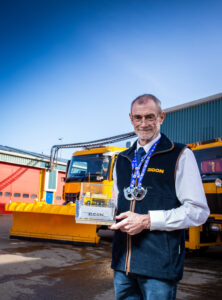Gritter manufacturer Econ Engineering is looking into two ‘greener’ alternatives to fuel its gritters.
The two options at the moment for the North Yorkshire based company, which makes 85% of the UK’s winter road maintenance vehicles, are hydrogen and Hydro-treated Vegetable Oil (HVO), which is currently being trialled by truck manufacturer, DAF.
But at this stage it, and the rest of the commercial vehicle sector, doesn’t see electric power as an option, as in severe weather gritters need to be working almost 24 hours a day, with just short periods off the road for re-fuelling and re-loading their grit hoppers.
Whilst the use of hydrogen in Heavy Goods Vehicles are still in the experimental stage, HVO is already in use by a small number of DAF truck fleet operators. It can be used in any diesel engine, either on its own, or mixed with red or white diesel and is 90 per cent cleaner than its red and white counterparts.
It is particularly popular by fleet operators in colder climates as it has a lower freezing point than oil derived diesel.
However, it has two barriers to widescale use in the UK. The first is it’s more expensive than traditional diesel. The second is it’s refined in continental Europe and then shipped to Tilbury where it is stored and then shipped via road tankers to operators with fuel storage bunkers.
Jonathan Lupton, Econ Engineering’s Operations Director said: “As a business we are very mindful of our carbon footprint and work hard to reduce wherever possible.
“We are examining a number of ways in which our winter maintenance vehicles can move away from traditional fossil fuels. Our partners at DAF are pioneering HVO, and this is fuel that has plenty of merits.
“Electric gritters are just not an option as the battery cannot deliver the necessary power to run a chassis and operate the hopper at the same time. And a recharge would take hours, which just isn’t viable, in snow conditions.
“A number of contracts that we are looking at are asking for zero emissions which is simply unrealistic for our sector. What they should be asking for instead is vehicles that have lowered their emissions. And with hydrogen-powered engines on the horizon and HVO already here, we know we can achieve this.”
























